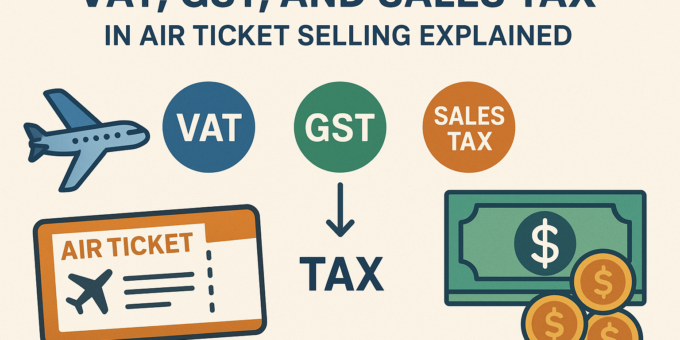
Air travel connects the world, but behind every air ticket lies a complex web of tax obligations. When travel agents, airlines, or online platforms sell tickets, they are not just selling a seat—they are also dealing with indirect taxes such as VAT, GST, and Sales Tax.
Unlike simple retail sales, air ticket taxation is layered with exemptions, special rules, and cross-border considerations. One wrong application could result in compliance penalties, disputes with tax authorities, or revenue loss. On the other hand, proper handling builds trust with customers, avoids legal issues, and ensures profitability.
In this guide, we will break down the differences between VAT, GST, and Sales Tax, explain how each applies in air ticket selling, and share practical strategies for compliance. Whether you are an airline, a traditional travel agency, or an online booking platform, this article will help you navigate the world of aviation taxation confidently.
Understanding Air Ticket Taxes
Air ticket taxes are unlike typical business taxes because air travel crosses jurisdictions. A single ticket may involve multiple tax regimes depending on departure point, destination, and the customer’s residency.
Here’s how each type of tax works in air travel:
-
VAT (Value Added Tax): Common in Europe, VAT is applied on the domestic portion of travel. For instance, a domestic Paris–Nice ticket would attract VAT, while a Paris–New York ticket would be exempt or zero-rated.
-
GST (Goods and Services Tax): Countries like India, Australia, and Canada use GST as a unified indirect tax. It usually applies to all domestic air travel, but international travel is often zero-rated.
-
Sales Tax: Unlike VAT and GST, sales tax is imposed at the final point of sale and usually at the state level. In the U.S., this varies by state, making compliance tricky for airlines and agencies operating across multiple jurisdictions.
The challenge for ticket sellers lies in correct tax classification. Misapplication may lead to overcharging passengers (leading to complaints and refunds) or under-collecting tax (leading to penalties).
What is VAT in Air Ticket Selling?
VAT applies differently in air travel compared to retail. In most cases:
-
Domestic Flights: Attract VAT since the service is consumed entirely within one country.
-
International Flights: Generally exempt or zero-rated because they involve cross-border consumption.
For example:
-
In the United Kingdom, VAT applies to domestic flights at 20%, while international flights are zero-rated.
-
In Germany, VAT applies at 19% on domestic tickets but not on international flights.
Travel agencies and airlines must carefully manage VAT invoices, ensuring they reflect the correct treatment. Errors in applying VAT can lead to double taxation or loss of exemption benefits.
VAT compliance also requires periodic reporting, often quarterly, where businesses declare their input VAT (on expenses) and output VAT (on sales). Since ticketing involves large transaction volumes, automation and Global Distribution Systems (GDS) play a crucial role in ensuring VAT is correctly applied.
How GST Impacts Air Ticket Selling
In countries with GST systems, ticket sellers must handle different GST slabs based on service categories. For instance:
-
In India, GST on economy-class air travel is 5%, while business-class tickets attract 12%. International flights are usually exempt.
-
In Australia, domestic flights attract GST at 10%, while international flights are GST-free.
For online travel agencies (OTAs) and travel agents, the challenge is ensuring that GST is applied correctly at booking and remitted to tax authorities. Airlines typically include GST in ticket prices, but agents issuing invoices must display GST separately to remain compliant.
An added complexity arises with intermediary services. Travel agencies often charge service fees, and these too may attract GST. Hence, both the ticket price and the service charge may be taxed differently, requiring accurate bookkeeping.
Proper GST handling helps avoid audit risks and ensures compliance with input tax credit (ITC) rules, where businesses can offset GST paid on purchases against GST collected from customers.
You Can Also Read : How to Structure a Global Air Ticket Business for Tax Efficiency
Sales Tax in Air Ticket Selling Explained
Unlike VAT or GST, Sales Tax is not a multi-stage tax. It is imposed once at the point of sale. In the United States, this creates a patchwork system:
-
Some states apply sales tax on domestic flights, while others exempt them entirely.
-
For international tickets, sales tax rarely applies.
For example:
-
California exempts air travel from sales tax.
-
Illinois imposes sales tax on certain charter flights but exempts commercial passenger tickets.
The complexity arises when a travel agent sells tickets in multiple states. They must track nexus rules (i.e., where the business has a tax obligation). This means if an agent operates in New York but sells to customers in Texas, they may or may not be liable for Texas sales tax depending on nexus laws.
Unlike VAT or GST, sales tax is not refundable, so once collected and remitted, it becomes part of the government’s revenue.
